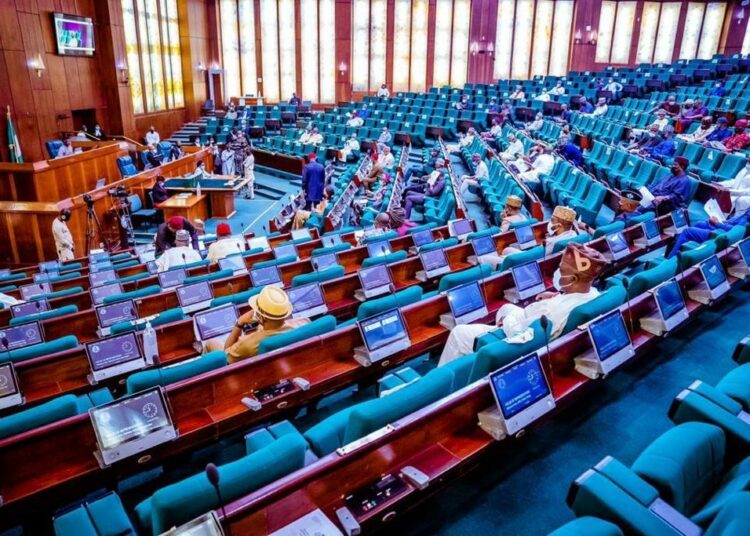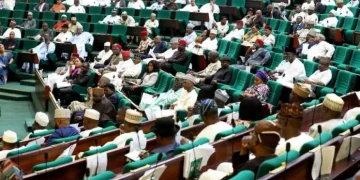The House of Representatives has directed the Nigeria Customs Service to stop the collection of the Comprehensive Import Suspension Scheme (CISS) levy, effective from the end of this month.
The chairman of the House Committee on Customs and Excise, Hon Leke Abejide (ADC, Kogi), gave the directive yesterday during the service budget defence session at the National Assembly Complex.
On Wednesday, Abejide also announced that the committee would hold a joint meeting with its Senate counterpart and the Minister of Finance and Economy, Mr Wale Edun.
He queried Customs’ inability to fully fund its personnel costs, overhead costs, and capital projects despite surpassing the total revenue projection for 2024.
“This committee is not unaware that CISS is not backed by any law in Nigeria. It is not in the Laws of the Federation of Nigeria, and even your 7% cost of collection is equally illegal, as it is not in the LFN.
“Another shocking revelation is that from January to December 2024, 60% of the 1% comprehensive import suspension scheme, which was part of the revenue source to fund your overhead, personnel cost and capital projects, recorded zero revenue.
“Also, payment was made to Web Fountaine Limited, which provided NCS with the network and automation. However, the Nigerian Customs Service has taken over about 80% of these operations and work schedules. Why are you not getting your share of 60% of the 1% CISS?
“The only legal source of income back by the Act of Parliament as signed by the President of the Federal Republic of Nigeria into Law and gazetted in LFN is the 4% Free-On Board which can be found in section 18(1a) of Nigeria Customs Service Act, 2023 (Federal Republic of Nigeria official Gazette No. 105 Lagos -9th June, 2023 Vol.110),” the opposition lawmaker said.
A member of the committee, Hon. Awaji-Iniombek Abiante(PDP, Rivers) demanded an explanation on the legality of the 1% collection by Customs, saying the CISS was “not an Act of the parliament but was handed to us by the military. And this is a democratic dispensation.”
In his response, the Comptroller General of the Nigeria Customs Service, Adewale Adeniyi, said the service expected the issue to have started last year but was unfortunately suspended.
“We feel we must go back and ensure we sensitise our stakeholders…We are on it. In this case, as discussed last year, the CISS did not receive anything on the 1% .”
On the 2024 budget performance, the committee’s chairman commended Customs for surpassing its revenue target of N5.08 trillion to N6.11 trillion, representing an increase of N1.03 trillion in 2024.
The Comptroller, represented by the Deputy Comptroller-General in charge of Finance, Administration and Technical Services, Bello Jibo, said the service’s revenue target for the 2025 financial year is N6.584 trillion.
He said this consisted of N3.853 trillion for the federation, N1.081 billion for the non-federation, and N1.650 trillion for import Value Added Tax (VAT).
On the 2024 budget, Jibo said: “The approved revenue target for 2024 stood at N5.079 trillion. The service collected a total revenue of N6.105 trillion from January to December 2024.”
Meanwhile, the Nigerian Ports Authority (NPA) targets N1.27 trillion revenue in the 2025 financial year, representing a 40 per cent increase from the N894.86 billion it realised in 2024.
The NPA’s managing director, Abubakar Dantsoho, disclosed this in a presentation on Monday during a budget defence session with the House of Representatives Committee on Ports and Harbours.
“Our 2025 budget proposal is more than figures; it reflects our aspirations for a more efficient, globally competitive port system,” Dantsoho told lawmakers, adding that over 70% of the proposed expenditure will go into capital projects.
He said the 2025 revenue is expected to come from the following key sources: Ship Dues, N544.06 billion; Cargo Dues, N413.06 billion; Concession Fees, N249.69 billion; and Administrative Revenue, N73.07 billion.
The chairman of the Committee, Hon. Nnolim Nnaji, urged the NPA to ramp up its performance, improve port infrastructure, and play a greater role in addressing Nigeria’s revenue and unemployment challenges.
“..The Nigerian Ports Authority is not just a revenue-generating agency but a national asset in terms of employment and economic impact. We expect to see detailed strategies to improve revenue generation and expand employment opportunities through your 2025 budget,” he said.











